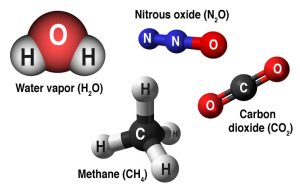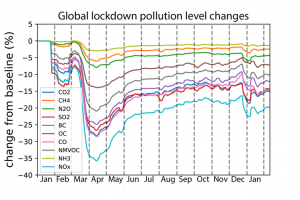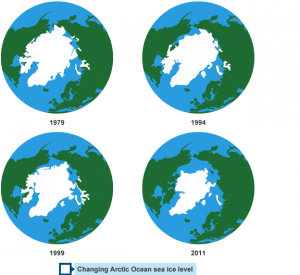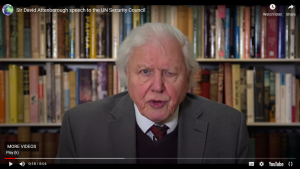What is climate change?
Definition; noun ‘a change in global or regional climate patterns, in particular a change apparent from the mid to late 20th century onwards and attributed largely to the increased levels of atmospheric carbon dioxide produced by the use of fossil fuels’
We cannot stress enough how much of an importance the topic of climate change is. Beginning in the 20th century the industrial revolution really kickstarted the effects on our planet. The effect is called the ‘Greenhouse Effect’ which is warming due to the atmosphere trapping heat that is radiating from Earth toward space. Certain gasses that are released into our atmosphere block the heat from escaping. Let us have a mini chemistry recap of the compounds:
-Water vapor. Water vapor increases as the Earth’s atmosphere warms, but so does the possibility of clouds and precipitation, making these some of the most important feedback mechanisms to the greenhouse effect.
-Carbon dioxide (CO2) is released through natural processes such as respiration and volcano eruptions, and through human activities such as deforestation, land use changes, and burning fossil fuels. Humans have increased atmospheric CO2 concentration by 47% since the Industrial Revolution began.
-Methane. A hydrocarbon gas produced both through natural sources and human activities, including the decomposition of wastes in landfills, agriculture, and especially rice cultivation, as well as digestion and manure management with domestic livestock.
-Nitrous oxide. A powerful greenhouse gas produced by soil cultivation practices, especially the use of commercial and organic fertilizers, fossil fuel combustion, nitric acid production, and biomass burning.
-Chlorofluorocarbons (CFCs). Synthetic compounds entirely of industrial origin used in a number of applications, but now largely regulated in production and release to the atmosphere by international agreement for their ability to contribute to destruction of the ozone layer.

Seen recently speaking to the United Nations Leaders is Sir David Attenborough. Highlighting some of the features of our current path due to climate change… things that will begin affecting the human populations security (food, ambient temperatures, shelter).
“Climate change is the biggest threat on our security that modern humans have ever faced”
We are coming close to certain tipping points that once passed, are impossible to come back from. The damage will have been done. By acting fast enough and promoting change there is hope.
As proved by the last 12 months, we are no longer separate nations, we are together and face the same difficulties. Recognise the importance of the moral responsibilities that the wealthy nations have on the rest of the world. Can we create a stable and equal world where everything is in balance? That is the true aim. Security, and sharing the world with nature.
Watch the full video here (click on the image to play the video)
How has the pandemic affected the rate of climate change?
Quite relevant to the current worldwide situation, but what does this mean for our climate… Unfortunately it appears that the short and long term effects are not as great as we had hoped. Demonstrating that we really do need to make progress and continue to use our developing technologies to help us work better with the planet.
 It is interesting to see how the effects of ‘lockdown’ affected emission rates. Shown here in this graph:
It is interesting to see how the effects of ‘lockdown’ affected emission rates. Shown here in this graph:
Read about the 3 things Climate Scientists have learnt during lockdown…
What is happening in the Arctic due to climate change?
Some changes include:
- Rising temperatures, present day temperatures are 2°C above average.
- Loss of sea ice and the melting of the Greenland ice sheet.
- The Arctic Ocean could become less saline and warmer (due to melting ice). This could disrupt the North Atlantic Drift and cause cooling of western Europe’s climate.
- Water from melting ice sheets and glaciers will contribute to rising sea levels.
Scientists are using ice cores to detect changes in temperature. When snow falls it traps air into the ice. When scientists take a core of ice it reveals the carbon dioxide and methane concentrations at the time the snow fell. Scientists believe there is a close link between the amount of these greenhouse gases in the atmosphere and global temperatures. Layers of accumulation and melting in the ice can reveal the temperature of each year for the past 400,000 years. Other methods of collecting evidence include glacial retreat, thermometer readings, early spring, and rising sea levels.
Here is a graph which demonstrates how rapidly the area of the Arctic has changed over the last half a century:

It is not just us who are facing the impacts. You must have seen the famous image of a polar bear stuck on a little platform of broken off ice?! They are losing their home due to the ice caps melting, but that also leads to problems finding enough prey to eat and feed to their young. Here are 11 other species that are being affected by the changing climate in the Arctic for various reasons. It is our responsibility to protect them and ensure they do not become extinct due to the actions of the human race.
We have a poster coming out next month which highlights the effects of climate change in the Arctic!
The posters can include a character of the sponsor’s choice, ranging from their family, their brand (maybe a vehicle or mascot), or something completely made up. These are professionally drawn up by our cartoonist who produces all of our posters and comics. These can be used for your branding and social media campaigns too!
If you would like to learn more about sponsorship please visit: Sponsor Us – Get Kids Into Survey
Or speak to Leanne and Sarah at hello@getkidsintosurvey.com
Contact Form
*Some information in this blog is collected from Causes | Facts – Climate Change: Vital Signs of the Planet (nasa.gov) and Case study: impact of climate change on the Arctic – Climate change – Eduqas – GCSE Geography Revision – Eduqas – BBC Bitesize


